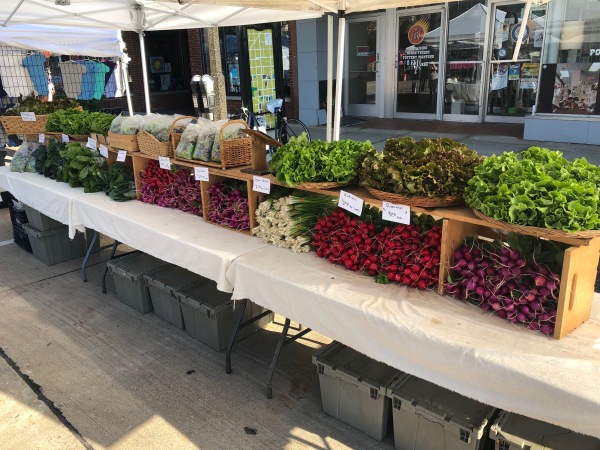The Pack
Three weeks ago, at our first Appleton farmers’ market, Polly and I could not sell a head of Concept lettuce to save our lives. Our Magenta lettuce heads sold fine, and the gleaming, vibrant radishes flew out to the hands and bags of gushing customers, but the Concept sat sadly on the top shelf of our market display, drooping dejectedly. The difference was subtle, but Polly explained that they had sat in the field a touch too long after harvest, and they could not hold up as well to the strain of the market table.
The following week, our crisp, erect Concept heads met gleeful enthusiasm — selling in swarms while the slightly blemished, yellow-leaf radish bunches stagnated in their display. Our customers, consciously or subconsciously, have demonstrated an exceptional discernment of quality – differentiating the pristine from the merely fresh. This is the difference between sale and no sale, and it’s up to us to make up the difference.
It comes down to the harvest and it comes down to the pack – two tasks demanding the ultimate mindfulness and focus. An unexpected distraction or lapse in concentration can turn a $50.00 crate of bunchable radishes to unsaleable seconds, and the transition from field to cooler requires diligence and coordination. Harvest days are serious business. With all that we’ve invested in the plants by the time of maturity – in seeds, trays, potting soil, compost, field space, water and labor – we can ill afford to let them go valueless.
So on our harvest days we’ve got teams of Sand Risers and workshares in the pack shed sorting, washing and bunching. It’s the workshares’ right and privilege to socialize and get distracted, and our duty to establish standards and maintain quality control. Monica is the best at this, and she rules the pack shed with an iron fist.

She was gone on Monday, however, so I oversaw a crew of workshares clipping, washing and bunching green onions. Quality control is neither my strength nor area of comfort, and given some of our early quality control issues, I micromanaged the scene intensively – sending back small bunches and binning them only at pristine cleanliness. If someone was to be responsible for a dissatisfied wholesale or CSA customer, it wasn’t going to be me.
And we’ve had our share of issues thus far. My brother got some limp, haphazard rhubarb in his first CSA box; my wife found a dirty bunch of green onions; we accidentally shorted the Coop ½ lb of kale, and, but for Polly’s diligence, we’d have delivered a wholesale order far short of our acceptable standard on many fronts. Most everything we’ve packed has been up to standard, however, and our CSA and wholesale members have been largely satisfied, with a great deal of bounty ahead. These are the early-season woes, and we’ve got no choice but to put them behind us.
On Tuesday, I worked on the CSA/wholesale pack. After getting the workshares set up bagging CSA peas and greens, I worked with Ed on packing the Coop order. Pulling our green onions from the cooler, we got to work sending the best and brightest out to our beloved local grocer. It’s unnervingly difficult to count to 30 with another person, however (especially when that person happens to be Ed Robitaillie) and we unboxed and recounted no less than three times, eventually reaching our elementary goal of counting to 30 as we put items in a box.
Later on, at the Coop, I looked upon the pristinely clean, fresh, hearty bunches of green onions on the shelf beneath our logo. They looked wonderful, and I was proud. It had, however, taken all the focus and attention that we had at every stage along the way. It always does.
